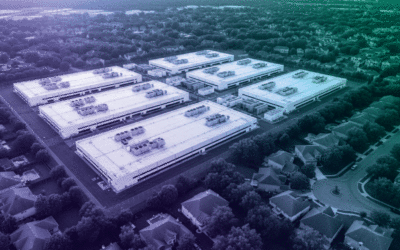Capstone leadership attended the Abu Dhabi International Petroleum Exhibition and Conference (ADIPEC), a gathering of over 2,200 companies across the energy value chain, the first week of November.
The atmosphere was euphoric. Conventional energy is back in vogue, driven by the conviction that data centers will create massive demand for traditional power generation. “Energy addition” replaced “energy transition” as the dominant theme, with consensus that the need for oil and gas would surge. An entire wing of the conference was dedicated to AI and energy, and speakers emphasized the growing demand for conventional and alternative sources amid Russian sanctions and Venezuelan supply disruptions. Everyone from large turbine suppliers to small compressor manufacturers was wandering the hallways discussing how to capitalize on the data center boom.
However, the same week, US state-level elections revealed a renewed threat to data center growth: intensifying concerns over electricity prices. Democrats won races in Virginia, New Jersey, and Georgia on platforms that explicitly targeted data center growth and promised lower power bills. These results signal an anti-data center coalition brewing ahead of the 2026 midterms. As Capstone has highlighted for almost two years, we believe state politics will continue to present both risks and opportunities for investment as policymakers weigh the benefits of increased tax revenue from data centers against local concerns over land use and energy prices. Understanding these political dynamics, often highly local, is critical for companies and investors banking on data center expansion.
In Georgia, two Democrats won seats on the Public Service Commission, the regulatory body that oversees utility rates and data center interconnection, by campaigning against electricity rate increases. Democrats had not won seats on the commission since 2007, and both candidates prevailed in heavily Trump-friendly districts. One victorious candidate, Peter Hubbard, pledged to “prioritize lowering power bills through smart investments in low-cost and highly reliable solar, battery storage, virtual power plants, energy efficiency, and market-based capacity sharing.” The other, Alicia Johnson, declared, “Georgians deserve a Public Service Commission that works for them—not for energy monopolies.”
In Virginia, the data center capital of the US, Governor-elect Abigail Spanberger (D) defeated her GOP opponent in part on promises that tech companies must pay their fair share for grid infrastructure upgrades necessitated by data center growth. John McAuliff, a 33-year-old innkeeper, won a race for the state House of Delegates in a district that has been in Republican hands for 30 years with a vow to “protect farmland and slow the spread of data centers.” We believe a near-term decision by Virginia state regulators to create new rules for data centers in the service territory of utility Dominion Energy Inc. (D) will likely guide Spanberger’s future policy.
In New Jersey, Governor-elect Mikie Sherrill (D) promised to freeze electricity rates and continue negotiating with PJM, the regional grid operator, to lower prices. We expect continued rhetoric out of New Jersey, but are skeptical the state will leave PJM.
The growing pockets of opposition to data centers transcend party lines. Republicans concerned about grid reliability and local control are joining Democrats worried about consumer costs and the prolonged lifespan of fossil-fuel power plants. For example, US Senator Josh Hawley (R-MO) is “doubling down” on concerns about data centers and slamming them as “electricity hogs.”
While the evidence suggests load growth generally helps reduce the fixed costs on retail bills, both sides of the aisle are increasingly concerned that large data center developments will strain the grid and drive up prices for residential and commercial ratepayers. This move also tracks well with populist distrust of Big Tech.
For Republicans, the push against data centers could be a tougher road to navigate than it is for Democrats. AI and data centers pit several Trump factions against each other. Technologists in the Trump administration support their proliferation, while MAGA Republicans, fueled by populism, are highly critical of data center expansion. Steve Bannon, a key MAGA voice, decried data centers as a “money grab” on a November 2nd podcast and highlighted the threats of economic displacement. US Representative Marjorie Taylor Greene (R-GA) broke with Trump in July and criticized data centers as a threat to local environmental dynamics and states’ rights.
“Just wait and see how bad lawsuits will become when counties are competing for data centers, in order to get rid of county property taxes,” Greene said. “The unintended result is new data centers that steal the water from surrounding homes and neighboring counties and states.”
Meanwhile, the GOP’s hawkish faction fears that data center growth internationally could allow China to gain access to key US technologies.
Republicans may eventually be forced to choose between taking on data centers or remaining aligned with Trump, who has supported expedited data center buildout. The administration’s policy is highlighted by the Department of Energy’s October 2025 proposal to the Federal Energy Regulatory Commission (FERC) to override states to accelerate data center interconnection. We continue to believe this proposal faces significant legal and political risk due to anticipated pushback from electric utilities and state policymakers.
An organized anti-AI coalition could significantly slow data center growth and create regulatory headwinds in politically “purple” markets, such as Georgia and Virginia, which are experiencing rapid data center expansion. However, the actual impact of data center buildout may be irrelevant. Even if data centers have marginal or negligible effects on energy costs, attacking hyperscalers and AI behemoths could become a highly resonant, bipartisan issue that makes data centers a political scapegoat. We believe the ongoing rulemaking process tied to the DOE’s proposal likely throws fuel on this fire. Both sides are learning from last week’s races to formulate messaging for the 2026 midterms and the 2028 presidential election.
The bottom line: ADIPEC’s energy optimism may prove well-founded, but only if data center developers and their power suppliers can successfully navigate the political backlash from rising electricity prices. State-level politics—not just federal policy or grid capacity—will determine which markets remain hospitable to data center growth and the timing required for these investments.




























